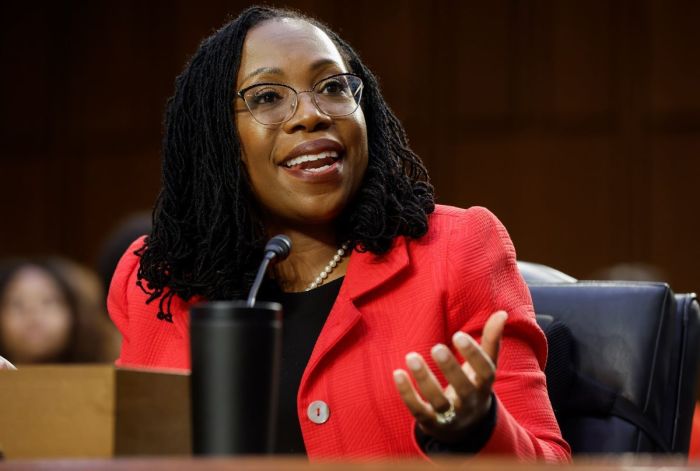Ketanji Brown Jackson criticized for saying First Amendment is 'hamstringing the government'

U.S. Supreme Court Justice Ketanji Brown Jackson drew criticism earlier this week for a line of questioning that appeared to criticize the view that the First Amendment is intended to limit the government.
Jackson's comments came Monday during oral arguments in Murthy v. Missouri, a case brought by the states of Louisiana and Missouri, as well as seven individual plaintiffs against Surgeon General Vivek Murthy and other members of the Biden administration.
The plaintiffs allege that the administration violated the First Amendment by illegally coercing social media companies to suppress posts and news stories expressing views unfavorable to federal officials on controversial issues related to COVID-19, Hunter Biden, election integrity and other things "under the guise of combating 'misinformation.'"
"My biggest concern is that your view has the First Amendment hamstringing the federal government in significant ways in the most important time periods," Jackson told Louisiana Solicitor General Benjamin Aguiñaga during the arguments.
KBJ doubles down: “My biggest concern is that your view has the First Amendment hamstringing the government in significant ways.”
— System Update (@SystemUpdate_) March 18, 2024
That is, quite literally, the entire point of the First Amendment—of the entire Bill of Rights. pic.twitter.com/gWMCaHDG1W
"And so I guess some might say that the government has a duty to take steps to protect the citizens of this country, and you seem to be suggesting that that duty cannot manifest itself in the government encouraging or even pressuring platforms to take down harmful information," she continued.
"So can you help me? Because I'm really — I'm really worried about that, because you've got the First Amendment operating in an environment of threatening circumstances from the government's perspective, and you're saying that the government can't interact with the source of those problems," she added.
Aguiñaga replied that while the government is free to interact with tech platforms, and should get involved in situations "that present such dangerous issues for society and especially young people," the way it does so "has to be in compliance with the First Amendment."
"And I think that means they can give them all the true information that the platform needs and ask to amplify that," he added.
Jackson earlier floated the hypothetical of social media companies allowing posts about "teens jumping out of windows at increasing elevations" to go viral and whether the government would have the right to persuade the platforms to take the content down.
Aguiñaga said that the First Amendment would protect even potentially dangerous speech.
Critics expressed concern with Jackson's comments, noting that the purpose of the First Amendment and the rest of the Bill of Rights is to restrain the government.
Missouri Attorney General Andrew Bailey endorsed the idea that the First Amendment was intended to limit the government.
"It is hamstringing, and it's supposed to," Bailey told Fox News. "The whole purpose of the Constitution is to protect us from the government, and the government exists to protect our rights. But here, the federal government is ignoring our First Amendment protections and weaponizing the federal government to silence our voices."
Limiting what the federal can do is "a good thing," Bailey contends.
Rep. Jim Jordan, R-Ohio, called Jackson's comments "literally one of the craziest things I've ever seen."
"That is frightening," Jordan said. "Because if she really believes that, that is scary, where we are heading. Understand what took place here. This was censorship by surrogate. This was big government telling Big Tech to take down speech that they disagreed with, and it was the most fundamental kind of speech. It was political speech."
"That's literally the point of the Bill of Rights," Republican California Rep. Bill Essayli tweted. "The government's powers derive from, and are subservient to, the rights of the People."
Journalist and former First Amendment lawyer Glenn Greenwald said that Jackson is "speaking for American liberals here and she's saying, 'We can't allow free speech anymore. It's too dangerous.'"
"That's what's at the heart of this case," he said. "That's what is at the heart of the Biden administration's behavior."
Reason associate editor Billy Binion contends that the furor Jackson caused with her comments was an example of "confirmation bias" as some conservative justices echoed Jackson's concerns regarding what extent the First Amendment restrains government actors.
Brett Kavanaugh offered the example of whether the First Amendment would bar government staff from calling journalists in an attempt to influence their coverage.
"Kavanaugh, for example, invoked his experience working with government press staff, who regularly call reporters to criticize them and try to influence their coverage," Binion wrote. "Would it be illegal for the feds to prosecute those journalists for pieces that cast them in a negative light? Absolutely. Is it beyond the pale for the government to express what it believes to be true in seeking better coverage? Not necessarily, Kavanaugh said. That doesn't mean they're correct. But the great irony of the viral Jackson pile-on is that, based on oral arguments, her view may very well prevail."
Jon Brown is a reporter for The Christian Post. Send news tips to [email protected]




























